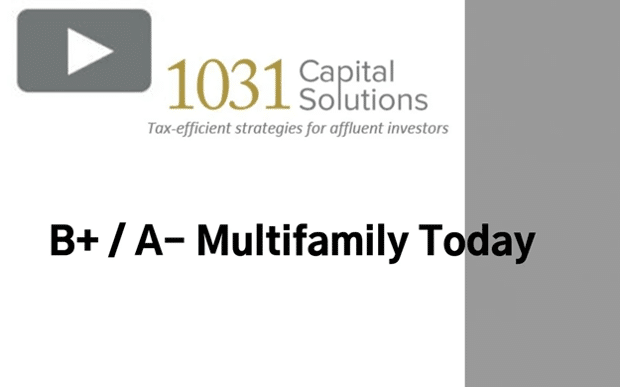
A+ / B- Multifamily Today
Much like art, there is some subjectivity to categorizing real estate investments into the familiar A, B and C ratings. Factors typically include age, condition and amenities, but also involve rent-per-square foot and location.
The differences between a C- and A+ property are pretty obvious, but things get a little fuzzier between, say, a B- and B property.
For purposes of this video, however, I would like to focus on a particular subset of properties, namely apartments that fall in the range of B+ to A-.
More specifically, I am referring to communities that are:
• Less than 15 years old or recently remodeled,
• Typically in non-coastal or secondary markets,
• In landlord-friendly states,
• Housing a combination of workforce tenants, renters by choice and future homeowners.
These properties have multiple amenities but are not deemed “luxury” apartments. Most residents in these properties have higher-than-average disposable income ratios. And for folks who can no longer afford to own or live in an expensive rental, B+ and A- properties may offer a more affordable yet attractive alternative.
According to a panel of experts on a recent Marcus & Millichap conference, we are seeing a few important trends in the multifamily sector:
RENT COLLECTIONS
• Residents of these types of professionally-managed communities take their credit history seriously and thus far are making their payments at nearly-normal rates, albeit delayed.
MARKET RATE VS. AFFORDABLE
• Residents of market-rate apartments, as opposed to “affordable” housing, are less likely to be employed in the hardest-hit sectors, such as restaurants, retail and transportation.
LENDERS ARE BEING FLEXIBLE
• Lenders are working flexibly with apartment owners, although B+ and A- apartments have generated relatively fewer problems regarding debt service.
CONSTRUCTION PAUSED
• New construction of apartment communities will be interrupted, thereby maintaining the supply/demand balance in favor of owners.
Furthermore, the states with less restrictive rent-control regulations tend to be the same states looking to re-open their economies.
According to the National Multifamily Housing Council, as of May 20, 90.8% of apartment households had made their May rent payment, which is only 2.2% lower than the same month in 2019.
Of course, there continues to be uncertainty across the real-estate investing spectrum. And we still don’t know the full economic impact of the recent historic spike in unemployment.
Nevertheless, people will continue to own real estate, and now, more than ever, there will be significant differences between the best and performing sectors.
There are many reasons to believe that apartments that fall between affordable and luxury may fare better than other classes of real estate.
If you or your clients are considering a 1031 exchange or simply want to explore your investing options, please give us a call today.
Thank you.
SOURCES: https://www.connectcre.com/conferences/nationalmultifamily-may2020
https://www.usatoday.com/story/money/2020/03/20/us-industries-being-devastated-by-the-coronavirus-travel-hotels-food/111431804/
https://www.nmhc.org/research-insight/nmhc-rent-payment-tracker/
This information is for educational purposes only and does not constitute direct investment advice or a direct offer to buy or sell an investment, and is not to be interpreted as tax or legal advice. Please speak with your own tax and legal advisors for advice/guidance regarding your particular situation. Because investor situations and objectives vary, this information is not intended to indicate suitability for any particular investor. The views of this material are those solely of the author and do not necessarily represent the views of their affiliates.
Investing in real estate and 1031 exchange replacement properties may involve significant risks. These risks include, but are not limited to, lack of liquidity, limited transferability, conflicts of interest, loss of entire investment principal, declining market values, tenant vacancies, and real estate fluctuations based upon a number of factors, which may include changes in interest rates, laws, operating expenses, insurance costs and tenant turnover. Investors should also understand all fees associated with a particular investment and how those fees could affect the overall performance of the investment.
Securities offered through Concorde Investment Services, LLC (CIS), member FINRA/SIPC. Advisory services offered through Concorde Asset Management, LLC (CAM), an SEC registered investment adviser. Insurance products offered through Concorde Insurance Agency, Inc. (CIA). 1031 Capital Solutions is independent of CIS, CAM and CIA.
continue reading
Related Posts
Changes are Happening Quickly – Don’t be Left Behind Managing […]
The Burdens of Managing Rental Property in Retirement Retirement should […]











